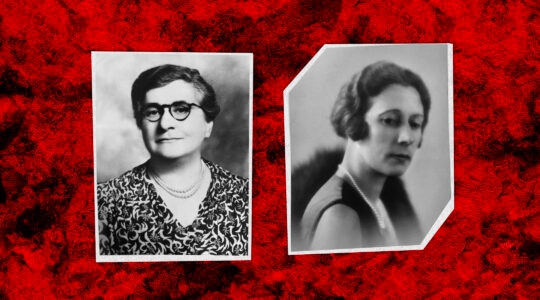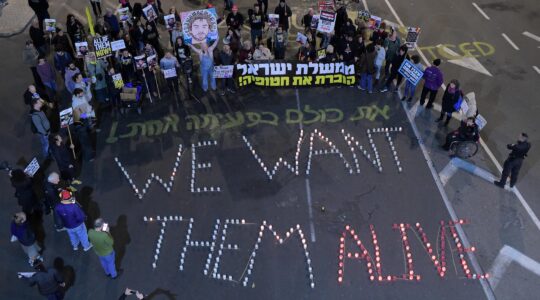WASHINGTON (JTA) — Why hasn’t prevention of a nuclear-armed Iran become a priority of the highest order for the American Jewish community, particularly at the grass roots? Many national agencies, including mine, have long urged more intense activism.
One hears many reasons for the relatively low-key response, including an overwhelming media focus on the domestic and global economic crisis. Iran does tend to be underplayed in the press. The story about a Chinese businessman being indicted for using New York banks to buy Iran materials to make nuclear weapons was buried deep inside The New York Times, while a human interest piece about the use of the Internet to return a lost camera made the front page.
In addition, the Iraq "syndrome" has had a chilling effect on any possible U.S. intervention in the Middle East.
Some in our community maintain that the Iranian threat just doesn’t seem "real." After all, they say, "we have been hearing warnings for many years and nothing has happened yet. Even if they get a weapon, they would never use it, fearing an Israeli nuclear reprisal."
Some things are so dreadful that we just do not want to think about them. While reading a short fiction piece in the November/December 2008 edition of Moment — “Three Dreams” by Andi Arnovitz — I was reminded of Hudson Institute founder Herman Kahn, who wrote a series of books in the 1960s about the possible effects of nuclear war, including “Thinking about the Unthinkable,” as well as the "unthinkable" events of Sept. 11, 2001.
Arnovitz describes in vivid detail the consequences of Iranian nuclear-tipped rockets slamming into Tel Aviv, Haifa and Jerusalem:
"In Haifa, entire freighters were swallowed up in the fire in the water, incinerating and drowning at the same time. The light was so strong, so blinding, that millions of people died without knowing what it was … they disappeared, leaving thin, accurately drawn traces of their silhouettes on cement walls, floors, things that remained standing. Every single leaf on every single carefully tended and manicured branch on every single tree in the Bahai garden burned off in an instant … buildings near the port slid down the molten hills and into the seething sea."
A pre-emptive Israeli military strike on Iran’s nuclear facilities also is something that is uncomfortable to think about. But along comes a study by Abdullah Toukan and Anthony Cordesman at the Center for Strategic and International Studies exploring the feasibility of such a strike and the potential military, political and environmental consequences.
One prediction in the study: “Attacking the Bushehr Nuclear Reactor would release contamination in the form of radionuclides into the air; most definitely Bahrain, Qatar and the United Arab Emirates will be heavily affected; any strike on this reactor will cause the immediate death of thousands of people living in or adjacent to the site, and thousands of subsequent cancer deaths or even up to hundreds of thousands depending on the population density along the contamination plume."
Persuading the Tehran mullahs, who may not behave with the kind of restraint shown by the Soviets during the Cold War, to step back from their current course, in fact, will require a vigorous, sustained and urgent international effort led by President Obama and his administration. The president unequivocally asserted that Iran’s acquisition of nuclear weapons capability is "unacceptable." He clearly is pursuing a diplomatic engagement strategy, unlike President George W. Bush, who chose to "quarantine" the Iranian leadership.
Whether this new approach will be successful remains to be seen. But one thing is clear: There is precious little time left before the threshold to nuclear weapons capability is crossed.
Recognizing the dangers not just to Israel but to the entire Middle East and beyond, the administration is moving quickly to address what it accurately perceives as a threat to fundamental American national security interests.
The American people can play a vital role in reinforcing the centrality and urgency of vigorous U.S. leadership, and it must start from the Jewish community whose manifest commitment will help galvanize like-minded allies in the broader community.
How can individuals constructively express their deep concern about the prospect of a nuclear-armed Iran?
Write and call the White House, the State Department and congressional offices, not just once but again and again; publish letters to the editor and op-ed pieces; encourage the convening of forums on Iran in synagogues and communal organizations; ask stock brokers whether they have terror-free investment options and support appropriate divestment initiatives; discuss with and send e-mails to your friends, neighbors and business associates; sign the petition on the Web site of United Against a Nuclear Iran and join its Facebook group; and contact your local community relations committee to learn what other steps can be taken.
As unpleasant and difficult as it may be, we have an obligation to think about the unthinkable and to do everything within our power to try to prevent it from coming to pass. There is no time to waste. Let’s get busy.
(Martin J. Raffel is the senior vice president for the Jewish Council for Public Affairs.)
JTA has documented Jewish history in real-time for over a century. Keep our journalism strong by joining us in supporting independent, award-winning reporting.





